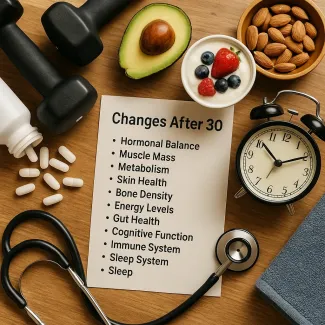
Choosing the Right Nutritional Supplements for Your 30s: A Practical Wellness Guide
Understanding your body's changing needs as you enter your thirties
Your thirties are a pivotal decade where prevention, balance, and sustained vitality become central to everyday well-being. Unlike in your twenties, when energy and recovery came effortlessly, entering your thirties often brings more subtle changes in metabolism, hormonal stability, skin elasticity, and immune performance. You may feel more fatigue after less activity, notice that skin doesn’t glow quite the same, or feel digestive discomfort from foods that never bothered you before. All of this points to one thing: your body needs targeted support, and often, the right supplements can help fill the gap left by modern diets.
Nutritional needs shift depending on lifestyle, genetics, workload, and dietary patterns, but there are five core categories of nutrients that most adults in their 30s consistently benefit from: vitamins B and D, omega‑3 fatty acids, collagen, and magnesium. These aren't trendy fads – they are fundamental tools for sustaining energy, promoting hormonal and skin health, and supporting mental clarity.
Why your thirties demand more than a multivitamin
Many people assume a daily multivitamin is enough, but in truth, the body often requires more targeted supplementation in your thirties. That’s because most multivitamins offer a broad, diluted spectrum of nutrients – not deep support in key areas like hormone regulation, gut health, or brain function. When you’re managing long workdays, planning a family, or adapting to new stressors, it’s essential to choose supplements that align with these real physiological changes.
Even healthy eaters frequently fall short of nutrients like vitamin D, omega‑3s, and magnesium, especially in busy, urban lifestyles with limited sunlight, convenience foods, and rising inflammation levels. And unlike your twenties, your thirties are when deficiencies start having visible consequences — poor sleep, thinning hair, frequent colds, sluggish digestion, or irregular menstrual cycles.
The right supplement plan isn’t about loading up on pills; it’s about choosing high-impact compounds that genuinely enhance your vitality, support biological balance, and protect you from early signs of aging.
B vitamins: restoring energy and supporting your nervous system
The role of B-complex in modern adult life
B vitamins are among the most overlooked yet essential micronutrients for people in their thirties. This group includes B1 (thiamine), B2 (riboflavin), B3 (niacin), B5 (pantothenic acid), B6, B7 (biotin), B9 (folate), and B12. Each one plays a crucial role in energy metabolism, brain function, and red blood cell production.
Many adults in their 30s, especially those under chronic stress, experience a depletion in B vitamins. This can manifest as brain fog, low mood, irritability, or fatigue – even with enough sleep. B12 deficiency is especially common among people who eat little meat or have underlying digestive imbalances.
Regular supplementation with a balanced B-complex can improve mental energy, sharpen focus, and help regulate mood swings, making it one of the most effective tools for anyone juggling work, family, and self-care. It also supports the body’s ability to deal with stress, reduces levels of homocysteine (a marker of cardiovascular risk), and promotes healthier skin and hair.
Vitamin D3 with K2: hormonal balance, bone strength and immune support
Why sunlight is no longer enough
By your thirties, vitamin D becomes critical, especially if you live in northern latitudes or work indoors. Known as the sunshine vitamin, D3 is vital for bone health, immune defense, and hormonal balance, particularly for women approaching perimenopause or dealing with irregular cycles.
But vitamin D doesn’t work alone. Its partner, vitamin K2, ensures calcium absorbed via D3 ends up in bones and teeth, not arteries or soft tissues. Without K2, high D3 supplementation can lead to calcium imbalances or cardiovascular concerns. This is why many experts now recommend taking D3 and K2 together in a balanced ratio – ideally with food containing some fat for absorption.
Supplementing with 2,000 IU of D3 and 100 mcg of K2 daily can support mood regulation, reduce frequency of infections, and help maintain bone density, particularly for women post-pregnancy or those with hormonal shifts. It’s a quiet yet powerful way to stay ahead of age-related changes in your immune and endocrine systems.
Omega‑3 fatty acids: brain, heart and skin nourishment
EPA and DHA for modern cognitive and cardiovascular health
Omega‑3s are essential fats your body can’t make on its own – they must come from food or supplements. Two types are particularly important: EPA (eicosapentaenoic acid) and DHA (docosahexaenoic acid). They support brain health, reduce inflammation, regulate cholesterol, and improve skin elasticity.
In your 30s, these fats are critical for mental focus, mood stability, and reducing chronic low-grade inflammation – the underlying factor behind many modern diseases. If you eat fish like salmon, sardines, or mackerel at least three times a week, you may get enough. But most people don’t.
A high-quality fish oil or algae-based omega‑3 supplement provides consistent intake of EPA and DHA. This supports heart rhythm, reduces joint stiffness, and enhances skin hydration. For those with anxiety or mild depression, omega‑3s can also provide natural support for emotional regulation.
Pregnant or breastfeeding women benefit even more from DHA for fetal brain development and their own postnatal mood. Omega‑3s are also linked to a lower risk of autoimmune conditions and metabolic syndrome.
Collagen peptides: preserving skin elasticity and joint flexibility
Structural support as aging subtly begins
While collagen is often associated with beauty, it’s actually the most abundant protein in the body, found in skin, joints, ligaments, and tendons. Production starts to decline after age 25, and by your mid-30s, that decline can accelerate – especially with stress, alcohol, or sugar-heavy diets.
Adding hydrolyzed collagen peptides to your daily routine can help restore skin elasticity, reduce the depth of fine lines, and improve joint mobility. The benefits aren’t just cosmetic. Collagen plays a vital role in gut lining integrity, hair growth, and nail strength.
Choose a supplement that includes type I and type III collagen, and ideally vitamin C, which is required for collagen synthesis. Taken consistently, collagen can help maintain firm skin, support connective tissues, and minimize the wear and tear on joints from sports, running, or long hours at the desk.
Magnesium glycinate: reducing stress, improving sleep, and calming muscles
A multitasking mineral you’re likely lacking
Magnesium is involved in over 300 enzymatic reactions, from muscle relaxation to nerve transmission to energy production. It’s also one of the most commonly deficient minerals in adults, thanks to depleted soils, processed foods, and stress-induced loss through urine.
Symptoms of low magnesium include muscle cramps, anxiety, poor sleep, PMS, and even heart palpitations. And yet, this mineral is rarely included in adequate amounts in most multivitamins.
Magnesium glycinate stands out for its superior absorption and gentle effect on the gut, unlike magnesium oxide or citrate which can cause loose stools. It helps calm the nervous system, supports deep sleep, and reduces inflammation, particularly for those with chronic stress, tension headaches, or restless legs.
Taken at night, it promotes restorative sleep and muscle recovery. For menstruating women, it also helps ease cramps and regulate hormonal balance, making it an ideal companion in your 30s wellness toolkit.
Optional additions based on lifestyle: adaptogens, probiotics, and iron
Tailored supplementation for unique demands
Beyond the five core supplements, some individuals benefit from lifestyle-specific additions. For example, adaptogens like ashwagandha or rhodiola can help people dealing with mental burnout or chronic fatigue. These herbs modulate the body’s stress response, improving resilience during demanding periods.
If digestion is inconsistent or there’s frequent bloating, a broad-spectrum probiotic can help balance gut flora, which in turn enhances nutrient absorption, immunity, and even mental clarity via the gut-brain axis.
Women with heavy menstrual cycles or post-partum recovery may need iron supplementation, particularly ferrous bisglycinate, a gentle form that doesn’t upset the stomach. Always pair it with vitamin C for better absorption.
All of these should be considered as add-on tools, evaluated based on lab work or personal symptoms. But for most, the foundation lies in B-vitamins, vitamin D3 with K2, omega‑3s, collagen, and magnesium.
Tips for choosing effective, safe supplements in your 30s
How to read labels and avoid common pitfalls
Not all supplements are created equal. Many products contain fillers, artificial additives, or insufficient dosages. Others use forms that are poorly absorbed or not bioavailable. For example, look for methylated B vitamins like methylfolate instead of folic acid, and magnesium glycinate over magnesium oxide.
Choose brands that offer third-party testing, use transparent labeling, and avoid proprietary blends that don’t disclose amounts. Quality supplements often cost more, but they offer better results and fewer side effects.
Avoid megadoses unless prescribed, and always take supplements with food unless advised otherwise, to enhance absorption and reduce potential nausea or discomfort.
Sticking to consistency, not quantity, is what creates sustainable health shifts. A few well-chosen supplements taken daily will have more impact than a shelf full of rarely used bottles.
Lifestyle integration: how to build a supplement routine that sticks
Making supplements work for your real life
Supplements are most effective when they fit seamlessly into your daily rhythm. Consider pairing magnesium or collagen with your evening routine, while B vitamins and omega‑3s go best with breakfast or lunch. Keep your supplements visible – in a drawer, next to your coffee maker, or as part of your gym bag essentials.
Creating habit loops, like taking your D3 with morning sun exposure or collagen in your smoothie, makes it easier to stay consistent. And don’t forget hydration – water intake helps with the delivery and metabolism of many nutrients.
It’s also helpful to reassess your needs every six to twelve months. If energy levels drop, sleep worsens, or your skin changes, it may signal shifting nutritional requirements. Tuning into your body remains the most important health habit of all.
Supporting long-term health through targeted nutrition
Investing in your future starts with small, daily actions
Your thirties set the stage for your forties, fifties, and beyond. It’s the decade when the foundations of healthy aging are built — or overlooked. Through consistent use of key supplements, most adults can reduce future risks of osteoporosis, cardiovascular disease, hormonal imbalances, and neurodegeneration.
Think of these supplements not as a fix, but as a form of preventative self-care. You don’t need every product on the shelf, just the few that align with your body’s real, evolving needs.
Incorporate them with intention, listen to your body’s signals, and allow your wellness routine to evolve with you — this is what thriving in your thirties really looks like.





